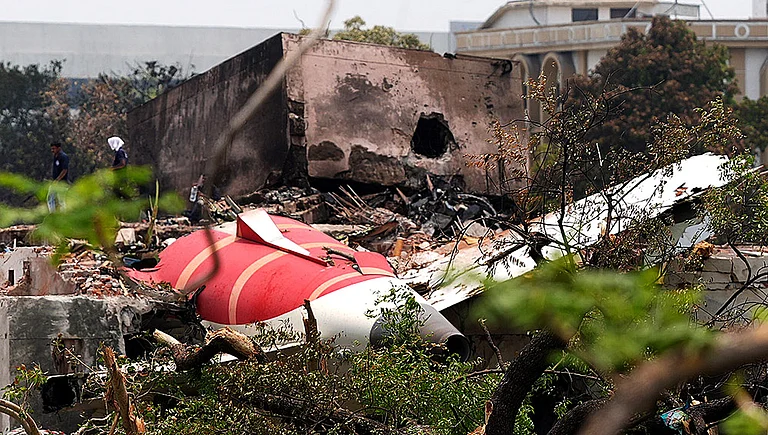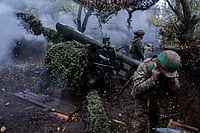Chilling details and a whistleblower testimony emerged from the first public hearing into the implosion of the OceanGate Titan submersible, which killed five people in June last year.
OceanGate's former director of operations, David Lochridge, testified that the company was focused towards making money, adding that "there was little in the way of science".
The public hearings, as part of the two-week inquiry by the US Coast Guard, began on Monday.
Unsafe, No Confidence Whatsoever
David Lochridge made shocking testimony at the hearing of the OceanGate Titan sub wreck. Resounding other the voice of other former employees, the former operations director of the company said that OceanGate head Stockton Rush was volatile and difficult to work with.
Notably, Rush was among the five people who lost their lives in the submersible's implosion. The Titan sub was owned by OceanGate and it was taken for several dives to the Titanic wreckage from 2021.
Lochridge had joined the company as a veteran engineer and submersible pilot in the mid-2010s. He said he was quick to sense that he was being used as a scientific credibility factor to the company.
The former employee said he felt that the company was selling him as part of the project "for people to come up and pay money" and that did not sit right with him.
"I was, I felt, a show pony," he told the Coast Guard investigators, adding that, "I was made by the company to stand up there and do talks. It was difficult. I had to go up and do presentations. All of it."
Later, while referring to a 2018 report, Lochridge said he had raised safety issues about OceanGate's operations. During the hearing, he said that a safety breach was "inevitable" as the company had "bypassed" all the standard rules.
With all of the safety concerns, Lochridge said he saw that there was no way he was signing off on this.
"No confidence whatsoever," he said while responded to whether he had any faith in the way the Titan submersible was being built.
Lochridge, who was fired in 2018 after raising safety concerns, said that the employee turnover was very high at the time. The OceanGate leadership had dismissed his concerns as their focus laid more on "bad engineering decisions" and a desire to get to the Titanic as soon as possible and start making money.
However, he said, "I didn't want to lose my job. I wanted to do the Titanic. But to dive it safely. It was on my bucket list, too."
Notably, the Washington-based firm had suspended its operations following the Titan's implosion. OceanGate's former engineering director Tony Nissen also testified before the investigators and told them that he felt "100 per cent" pressure to get the vessel ready to dive.
He had refused to pilot the submersible for a journey several years before its final trip. Nissen had worked on a prototype hull that predated the Titanic expeditions. He had told Rush, "I'm not getting in it."
However, Nissen paused before responding that the safety decisions and testing were not compromised under the pressure.
"No. And that's a difficult question to answer, because given infinite time and infinite budget, you could do infinite testing," Nissen said at the hearing.
Bonnie Carl, the former finance and human resources director of OceanGate, told investigators that operations head Lochridge had deemed Titan as "unsafe".
At the beginning of the hearing, US Coast Guard investigators had noted that unlike standard practice, the Titan submersible had not been independently reviewed and its unusual design put it under scrutiny in the undersea exploration community.
LAST MESSAGE FROM TITAN CREW
With five people on board, the Titan submersible had taken its last dive on June 18, 2023. The crew had lost contact after an exchange of messages about the sub's depth and weight as it descended.
Support ship Polar Prince had repeatedly texted Titan, asking if it could still see the ship on its onboard display.
A visual re-creation of the Titan submersible in the water was presented before investigators earlier in the hearing.
As officials went through the communications between Titan and Polar Prince, they found the last message from the submersible -- minutes before its implosion -- to the support ship was, "Yes, all good here".
Witnesses In The Hearing
As many as 10 former employees of OceanGate have been listed as witnesses to testify before the US Coast Guard's Marine Board of Investigations (MBI). OceanGate co-founder Guillermo Sohnlein and former scientific director Steven Ross are also included in the list.
Several guard officials, scientists, and government and industry officials are also likely to testify at the hearings.
However, OceanGate head Stockton Rush's wife, Wendy Rush -- also the firm's communications director -- is not included in the witness list. Coast Guard spokesperson Melissa Leake said that they do not comment on the reasons for not calling specific persons to a particular hearing while probe is underway.
Leake said it is a common practice for MBI to "hold multiple hearing sessions or conduct additional witness depositions for complex cases".
Meanwhile, OceanGate in a statement said that though it has no-full time employees at this time, the firm will be represented by an attorney. It added that it has been cooperating with the Coast Guard and NTSB investigations since they began.
Notably, the ongoing probe by the MBI is the highest level of investigation conducted by the US Coast Guard. And when the hearing will conclude, recommendations will be submitted to the Coast Guard's commandant. A parallel investigation is also being undertaken by the National Transportation Safety Board.
A LOOK BACK
Titan Goes Missing
The deep-sea Titan submersible, owned by OceanGate, took its final dive on June 18, 2023. And nearly an hour and 45 minutes later, it lost contact with the support vessel Polar Prince.
According to Canada's Joint Rescue Coordination Centre in Halifax, Nova Scotia, the vessel was reported overdue 435 miles (700 kilometers) south of St John's, Newfoundland.
The Titan expedition was meant to reach the Titanic wreckage as well as underwater ecosystem that shipwrecks often spawn. The submersible was piloted by OceanGate CEO Stockton Rush and other four passengers were British billionaire Hamish Harding, French oceanographer and Navy veteran Paul-Henri Nargeolet, Pakistani businessman Shahzada Dawood and his son Suleman.
Titan Implosion Kills All Aboard
A multinational search operation was launched to look for the vessel, which after five days, was found destroyed in a "catastrophic implosion". The US Coast Guard had said all five aboard the Titan were killed.
US Coast Guard Rear Admiral John Mauger had told Reuters at the time that a robotic diving vehicle from a Canada-based ship had discovered a debris field from Titan on the seabed around 1,600 feet (488 meters) from the bow of the Titanic, 4 kilometers beneath the surface in a remote North Atlantic corner.
The 21-feet submersible had imploded while on descending to the Titanic ship wreckage some 12,500 feet underwater when it had lost contact with the support vessel.
In a statement, OceanGate had said, "These men were true explorers who shared a distinct spirit of adventure, and a deep passion for exploring and protecting the world's oceans. Our hearts are with these five souls and every member of their families during this tragic time."
What Is An Implosion?
Authorities had termed that the Titan submersible debris was "consistent with a catastrophic implosion of the vessel". An implosion is a sudden inward collapse of a body. In this case, the Titan is understood to have imploded on the day it submerged, which is June 18, 2023.
Media reports had said that the US Navy detected a sound that would match an implosion, adding that search teams had found fragments of the Titan submersible.
A Florida International University professor, Aileen Maria Marty, had said, "The entire thing would have collapsed before the individuals inside would even realize that there was a problem. Ultimately, among the many ways in which we can pass, that’s painless."
Marty had said that a catastrophic implosion is "incredibly quick" within just a fraction of millisecond.
US Coast Guard Rear Admiral John Mauger had described the Titan wreck investigation as a "complex case".



























